
igiene

- How Chess Games are Won (Reshevsky)
'How Chess Games are Won' by Samuel Reshevsky.
|
|
55 games, 1951-1960 - Hypermodern chess: Aron Nimzovich by Reinfeld
Hypermodern chess: as developed in the games of its greatest exponent, Aron Nimzovich The definitive collection of nimzovich's revolutionary games and their startling unconvential theories.
Dover publications, New York 1958
Fred Reinfeld
|
|
56 games, 1904-1934 - India de Rey - Mar del Plata - Nakamura
Partidas de esta variante en la que siempre ganó Nakamura.
|
|
8 games, 2009-2015 - Instructive rook endings
Whenever I see an interesting rook ending I want to analyze further, I add it to this collection.
|
|
101 games, 1858-2006 - Isaac Boleslavsky - Selected Games
|
Published by Caissa Books (Publishing) Ltd in 1988 ISBN 1 870816 06 4
Edited and translated by Jimmy Adams this book was an English translation of Soviet Grandmaster Isaac Boleslavsky 's book "Izbrannye Partii" ( Selected Games ) and augmented with a further selection of his games post 1955. Boleslavsky (1919 - 1977) was an outstanding Opening Theoretician and pioneered systems in the King's Indian and Sicilian Defences. The high point of his playing career was shared first place in the Candidates Tournament of 1950. However, at heart he was primarily a researcher and analyst and he was held in very high regard by his peers. Tigran Petrosian selected him to be his second for the World Championship Matches 1963 - 1969. - From The Author
I became acquainted with chess in 1928, when I was nine years old. The children's chess movement then was still in its incipiency. The House of Pioneers with chess circles appeared several years later. Up to the age of fourteen years I did not play a single tournament game, while even casual games I played very rarely because of the lack of partners. I learned to play through books. The first of my primers were "Chess Fundamentals" by Capablanca, "First Book of Chess" by G.Y. Levenfish, and Y.G. Rokhlin's manual. These handbooks gave me my first knowledge of the principles of play, about the elements of tactics and the positional basis of the game. With help from these, virtually without practice, I brought my play up to approximately the strength of third category. Books played an enormous role also in my further perfection. In 1939, when I achieved the rank of master, the number of games I had played with first category players did not exceed twenty, while masters I had in all encountered twice. Nowadays I cannot imagine a strong player not possessing a firm foundation of theory. But, speaking of a knowledge of theory. I by no means wish to belittle the role of practice. A rapid growth of a chessplayer is possible only by a harmonious combination of the first and second. A too "bookish" approach to the game of chess created in my play defects which I had to subsequently overcome for quite a long time. An insufficiently concrete approach to a position: overestimation of the strength of the two bishops, unnecessary fear of the weakness of squares and pawns - this is what I had to eliminate in my tournament practice. A great impression was made upon me by Alekhine's book "My Best Games", with which I had become acquainted in 1932. I was attracted not only by Alekhine's brilliant combinations, but also the logicality, the consistency featured in the collection of games, the purposefulness of each move, the immediate exploitation of the slightest mistake by the opponent. The creative work of the world's best chessplayers in the first instance Alekhine revealed to me the aesthetic value of the game of chess. In playing, I did not strive for victory just for the sake of points, and considered that only the win of a consistently played game could give real satisfaction. I did not agree with the now widespread view that, since chess is a struggle, then mistakes on both sides are inevitable, natural, and do not reduce the value of a game. Indeed, the game of chess is a struggle, but in the first place a struggle of ideas, and therefore the winner, if he wants to prove the value of his victory, ought to prove the correctness of his ideas. The game of chess is inexhaustible, and a single person, no matter how great his talent, cannot achieve perfection in it. However, striving for perfection, that is for faultless play, is the duty of every chessplayer, begining with first category and ending with the world champion. In the present collection, for the most part, are included games consistently played by the winning side. There are games in which the chances fluctuate from side to side, but an exceptionally complicated and sharp struggle makes these interesting for the reader. In the collection are included several games with a drawn result, in which attack and defence were on an equal height. With regard to the comments on the openings of the games, I have stuck to this aim: not to deal with, or scarcely deal with, well known openings and variations which the reader can find in any manual, and, on the other hand, dwell more or less at length on topical variations which are the objects of analysis and debate by our masters and grandmasters. Isaac Boleslavsky.
-
|
|
179 games, 1938-1971 - Ivan Sokolov's Best Games
31 games, 1989-1996 - Joel Benjamin - Selected Games
52 games, 1976-1996 - Judgment and Planning in Chess (Euwe)
'Judgment and Planning in Chess' by Machgielis Euwe.
Translated and edited by Julius Du Mont.
|
|
54 games, 1887-1951 - KIA A. Tsvetkov Book, 1972
55 games, 1952-1970 - King's Indian
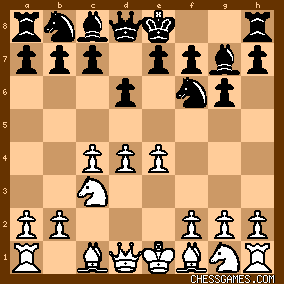
click for larger view
1.d4 Nf6 2.c4 g6 3.Nc3 Bg7 4.e4 d6
Classical Variation: 1.d4 Nf6 2.c4 g6 3.Nc3 Bg7 4.e4 d6 5.Nf3 0-0 6.Be2 e5 7.0-0 Nc6 8.d5 Ne7
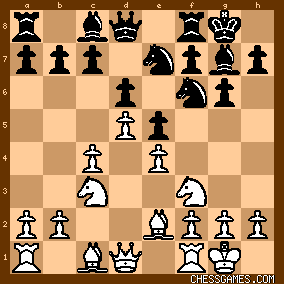
click for larger viewSaemisch Variation: 1.d4 Nf6 2.c4 g6 3.Nc3 Bg7 4.e4 d6 5.f3

click for larger viewPetrosian Variation: 1.d4 Nf6 2.c4 g6 3.Nc3 Bg7 4.e4 d6 5.Nf3 0-0 6.Be2 e5 7.d5

click for larger viewMakegonov Variation: 1.d4 Nf6 2.c4 g6 3.Nc3 Bg7 4.e4 d6 5.h3

click for larger viewGligoric Variation: 1.d4 Nf6 2.c4 g6 3.Nc3 Bg7 4.e4 d6 5.Nf3 0-0 6.Be2 e5 7.Be3

click for larger viewFianchetto Variation: 1.d4 Nf6 2.c4 g6 3.Nf3 Bg7 4.g3 0-0 5.Bg2 d6 6.0-0
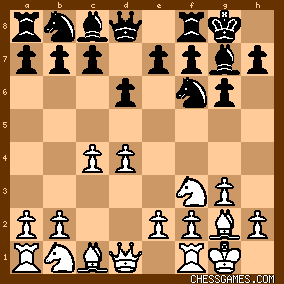
click for larger viewFour Pawns Attack: 1.d4 Nf6 2.c4 g6 3.Nc3 Bg7 4.e4 d6 5.f4 0-0

click for larger viewAverbakh Variation: 1.d4 Nf6 2.c4 g6 3.Nc3 Bg7 4.e4 d6 5.Be2 0-0 6.Bg5
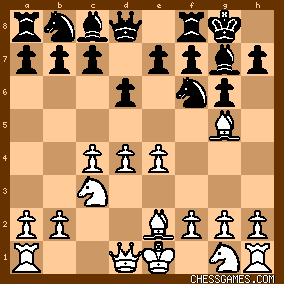
click for larger viewSmyslov Variation: 1.d4 Nf6 2.c4 g6 3.Nc3 Bg7 4.Nf3 0-0 5.Bg5

click for larger viewKramer Variation: 1.d4 Nf6 2.c4 g6 3.Nc3 Bg7 4.e4 d6 5.Nge2 0-0 6.Ng3
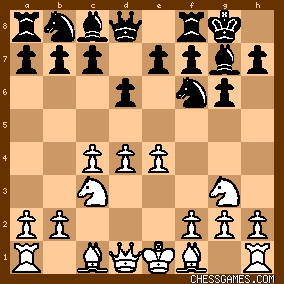
click for larger view4.Bg5
4.Nf3 0-0 5.Bg5
4.Nf3 0-0 5.Bf4
4.e4 d6 5.Bg5
Typical Middlegame Themes:
e4-f4 pawn sacrifice:
Kotov vs Gligoric, 1953
Gheorghiu vs Kasparov, 1988
J Pinter vs Nunn, 1988
Botvinnik vs A Pomar, 1962 Exchange sacrifice on f4:
A Riazantsev vs E Inarkiev, 2008 Nf4 pawn sacrifice: Kamsky vs Kasparov, 1992 Nd4 pawn sacrifice: M Sorokin vs Bologan, 2007 Sacrifice of h6-pawn:
Sacrifice to destroy White's centre:
E Alekseev vs E Inarkiev, 2009
J Polgar vs Spassky, 1993
Aronian vs Carlsen, 2010 Re-routing N on g6 to g5 or h6:
Korchnoi vs Fischer, 1970
Najdorf vs Gligoric, 1953 Queen on g1-a7 diagonal:
J Piket vs Kasparov, 1989 ...Nxd5 to clear f5 square for other N:
A Summerscale vs M Hebden, 2000 ...Nxe4 or ...Nxd5 to clear path for Queen:
Larsen vs Tal, 1969
R Milutin vs D Petrosian, 2008
A Beliavsky vs Nakamura, 2009 ...h4, ...Nh5, ...Ng3, ...h3 in response to Bg1 defence:
G Burgess vs W N Watson, 1989
J Piket vs R Douven, 1988
Korchnoi vs J Ye, 1990 ...Nf4 piece sacrifice:
Speelman vs Uhlmann, 1984
Botvinnik vs Tal, 1960
Kavalek vs Kasparov, 1982 ...Ng3 silent sacrifice:
Lputian vs I Nataf, 2005 ...Bh3 silent sacrifice: Ftacnik vs O Cvitan, 1997 ...Ng4 silent sacrifice:
Shamkovich vs R Nezhmetdinov, 1961 ...g3 pawn sacrifice:
A Ali Saif vs Timoshenko, 2000 ...g4 pawn sacrifice, with ...f3 followup:
V Rogovski vs Radjabov, 2001 ...g3, ...Bh3 silent sacrifice:
Gelfand vs B Kantsler, 2001 ...g3, ...Nh3 silent sacrifice:
Shirov vs Radjabov, 2009 ...g3, ...Bh6: Epishin vs J Polgar, 1993 ...g4 pawn sacrifice:
Najdorf vs Gligoric, 1953
Kamsky vs Kasparov, 1992 ...Bf6, ...Bh4, ...Bg3 manoeuvre:
G Andruet vs V Spasov, 1990 ...Nxg2 sacrifice:
S Yuferov vs Kasparov, 1978
T Roussel-Roozmon vs P Charbonneau, 2008
Gelfand vs Nakamura, 2010 ...gxf3: Gavrikov vs Smirin, 1988 ...fxe4 fxe4, attack down the f-file: H Hamdouchi vs Sutovsky, 1993 Playing on Q-side with Qb8 and Be7-Bd8:
A Gavrilov vs A Shomoev, 2007 ...Bxc3:
Bronstein vs Petrosian, 1956
Timman vs Tal, 1973 ...Bh6 trick
Typical mistakes: Flohr vs Suetin, 1950 …a4, …Nb3:
A Lauber vs Fressinet, 2010 Endgames: A Gavrilov vs A Shomoev, 2007 Great King's Indian practitioners.
Garry Kasparov Bobby Fischer Teimour Radjabov Hikaru Nakamura Leonid Stein David Bronstein Svetozar Gligoric Isaac Boleslavsky Zigurds Lanka Eduard Gufeld John Nunn Rustam Kasimdzhanov Ernesto Inarkiev
|
|
424 games, 1890-2017 - King's Indian Defence - Mar del Plata Centre
Games illustrating concepts & themes found in "Mastering The King's Indian Defense" by Bellin & Ponzetto (Batsford) Chapter 1:Mar del Plata Centre
|
|
33 games, 1952-2010 - King's Indian Gems
|
Some fascinating and entertaining games played in this extremely sharp and dynamic opening. Biased towards Kasparov, but I find some of his KID games to be among the most fascinating and entertaining in history.
|
|
18 games, 1973-2013 - King's Indian pioneers
There are 4 men who are king's Indian pioneers.That means they are men who taught the world how to play King's Indian (mainly for Black).So,here they are:Bronstein,Boleslavsky,Geller and Gligoric.Enjoy!
|
|
92 games, 1942-1997 - Koblenz, "Ajedrez de entrenamiento"
Partidas en la edición Escaques, de Editorial Martínez Roca.
|
|
60 games, 1907-1965 - Laszlo Szabo - underappreciated brilliance.
Laszlo Szabo. 1917-1998.
This collection exists to right a wrong - namely the absence of a chessgames collection for this magnificent player. Many of his best games are marvellous displays of attacking prowess, but there are a few endgame gems that have to be seen to be believed. A true great of the game.
|
|
31 games, 1933-1982 - Life and Games (Najdorf/Mikhalchishin/Lissowski)
'Najdorf: Life and Games' by Miguel Najdorf, Adrian Mikhalchishin and Tomasz Lissowski.
Translated by John Sugden.
|
|
131 games, 1928-1980 - Life and Games (Tal)
'The Life and Games of Mikhail Tal' by Mikhail Tal.
Translated by Kenneth Neat.
Edited by John Nunn.
|
|
100 games, 1949-1975 - Linares 1992
|
The 10th [[Torneo Internacional de Ajedrez "Ciudad de Linares"]] took place under the direction of Luis Rentero Suarez, with the players Garry Kasparov (Elo #1 in the world), Anatoly Karpov (#2), Vassily Ivanchuk (#3), Nigel Short (#4), Viswanathan Anand (#5), Boris Gelfand (#6), Artur Yusupov (#9), Valery Salov (#10), Evgeny Bareev (#11), Jonathan Speelman (#15), Jan Timman (#19), Alexander Beliavsky (#21), Ljubomir Ljubojevic (#30), and Miguel Illescas (#100). Of the top 10 players in the world, only Alexey Shirov (#7) and Gata Kamsky (#8) were missing. Kasparov, Karpov, Ivanchuk, Anand, Gelfand, Salov and Beliavsky had played in the first Category 18 event Reggio Emilia (1991/92), and Bareev had won at Hastings (1991/92). Salov and Gelfand had shared the win at Hoogovens (1992), and Anand, Karpov, Ivanchuk, Speelman and Ljubojevic had played in the first Melody Amber (1992) rapid tournament in early February. The world champion Kasparov won with 10/13. Of his last five tournaments, he had won only Tilburg Interpolis (1991). He beat Timman in Round 1 and Karpov (in their 161st game) in Round 2, and was leading all the way. In Round 12, he secured the tournament win by drawing against Salov. According to Leontxo García, Kasparov reacted with fury after the draw, despite winning the first prize of the tournament with one round to go. "Kasparov squandered a point against his compatriot Salov, who managed to draw after six hours, and left the stage with heavy gestures, not allowing anyone to congratulate him ... Timman can tie with the champion but has the unfavorable coefficient ... with his head in his hands, the Azerbaijan born Russian responded at the board with contempt on those who told him that he was guaranteed first place ... While waiting for Salov to analyze the critical position, he shouted: "Draw! Draw! How could I make a draw in this game?"" Kasparov won his last round game (with the black pieces against Ljubojevic) and Timman lost his (with black against Salov), so that Ivanchuk and Timman ended 2nd and 3rd with 8/13. A special prize was awarded to Short vs Timman, 1992 as the most beautiful game. <Hotel Anibal, Linares, Spain, 23 February - 13 March 1992> table[
Age Elo 1 2 3 4 5 6 7 8 9 0 1 2 3 4
1 Kasparov 28 2780 * ½ 1 1 ½ 1 ½ ½ ½ 1 1 1 ½ 1 10
2 Ivanchuk 22 2720 ½ * ½ ½ ½ 1 0 ½ ½ 1 1 ½ 1 ½ 8
3 Timman 40 2620 0 ½ * 1 0 ½ 0 1 0 1 1 1 1 1 8
4 Karpov 40 2725 0 ½ 0 * ½ ½ 1 0 1 ½ 1 1 ½ 1 7½
5 Anand 22 2670 ½ ½ 1 ½ * ½ ½ ½ 1 0 1 ½ ½ 0 7
6 Gelfand 23 2665 0 0 ½ ½ ½ * 1 1 0 ½ 1 ½ ½ 1 7
7 Salov 27 2655 ½ 1 1 0 ½ 0 * 0 ½ ½ ½ 1 ½ 1 7
8 Bareev 25 2635 ½ ½ 0 1 ½ 0 1 * ½ 1 0 ½ ½ ½ 6½
9 Beliavsky 38 2620 ½ ½ 1 0 0 1 ½ ½ * 0 ½ 0 ½ 1 6
10 Yusupov 32 2655 0 0 0 ½ 1 ½ ½ 0 1 * 0 ½ 1 1 6
11 Illescas 26 2555 0 0 0 0 0 0 ½ 1 ½ 1 * 1 1 ½ 5½
12 Ljubojevic 51 2610 0 ½ 0 0 ½ ½ 0 ½ 1 ½ 0 * 1 0 4½
13 Speelman 35 2630 ½ 0 0 ½ ½ ½ ½ ½ ½ 0 0 0 * ½ 4
14 Short 26 2685 0 ½ 0 0 1 0 0 ½ 0 0 ½ 1 ½ * 4 ]table Tournament category: XVII (2659). Chief arbiter: Faik Gasanov. Four of the players returned to Linares in late April to play the Timman - Yusupov Candidates Semifinal (1992) and Short - Karpov Candidates Semifinal (1992). Kasparov, Ivanchuk, Anand, Salov and Bareev next played in Dortmund Sparkassen (1992) which started April 16. <Sources>
FIDE rating list January 1992 (http://www.olimpbase.org/Elo/Elo199...)
Various authors in [[Jaque]] 326, pp. 3-57 (http://www.bartelski.pl/olimpbase/l...)
Leontxo García in [[El País]], 12 March 1992 (https://elpais.com/diario/1992/03/1...)
Leontxo García in [[El País]], 15 March 1992 (https://elpais.com/diario/1992/03/1...)
Canal Sur video clips from Linares 1992 (https://www.youtube.com/watch?v=0t_...)
[[Tidskrift för Schack]], April 1992, pp. 176-183 (http://www.schack.se/tfsarkiv/histo...)
Raymond Keene in [[The Spectator]], 14 March 1992, p. 52 (http://archive.spectator.co.uk/arti...)
Raymond Keene in [[The Spectator]], 21 March 1992, p. 52 (http://archive.spectator.co.uk/arti...)
Joan Segura in [[El Mundo Deportivo]], 24 Feb 1992, p. 75 (http://hemeroteca.mundodeportivo.co...)
Roman Toran in [[La Vanguardia]], 23 Feb 1992, p. 51 (http://hemeroteca.lavanguardia.com/...)
Lennart Hansson in [[Tidskrift för Schack]], March 1992, p. 129 (http://www.schack.se/tfsarkiv/histo...)
Robert Byrne in [[New York Times]], 15 March 1992 (https://www.nytimes.com/1992/03/15/...) Previous edition: Linares (1991). Next: Linares (1993) [Original collections: Game Collection: Linares 1992 by User: suenteus po 147 and Game Collection: Linares 1992 by User: Tabanus. Round dates (from El Mundo Deportivo): February 23, 24, 26, 27, 29, March 1, 3, 5, 7, 8, 10, 11, 13. ]
|
|
91 games, 1992 - Maestro from Baku: Vladimir Makogonov
58 games, 1927-1951 - Master Games - Modern Chess (Tartakower/du Mont)
'100 Master Games of Modern Chess' by Savielly Tartakower and Julius Du Mont.
|
|
75 games, 1938-1952
|
|
| SEARCH ENTIRE GAME COLLECTION DATABASE |
use these two forms to locate other game collections in the database

|
|



